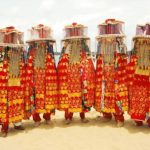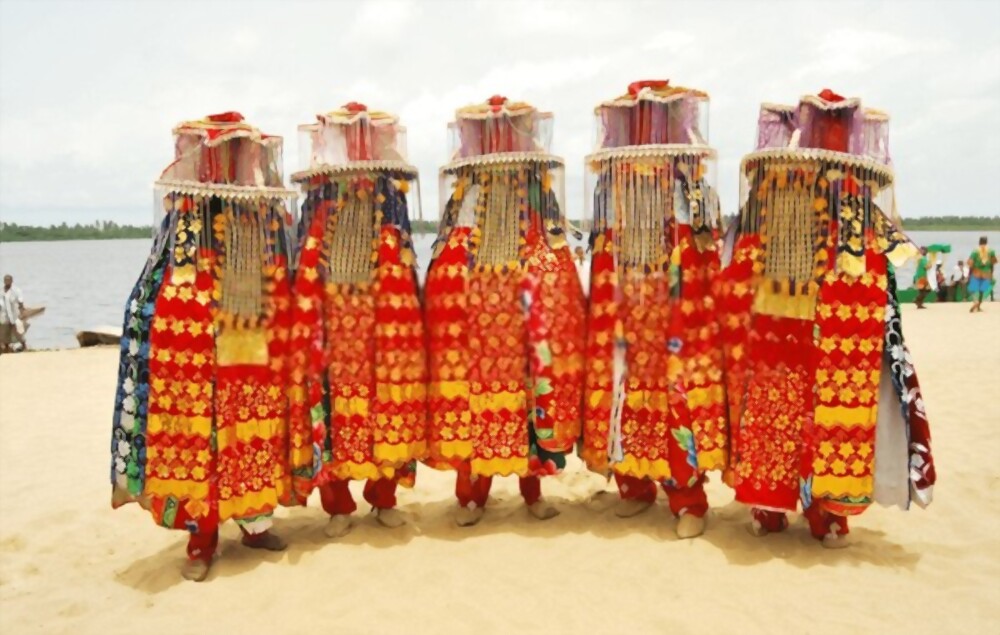Masquerade festivals in Africa are a cultural and traditional expression practised to communicate with the spirits or exalt their ancestors. The masquerades themselves are believed to be manifestations of ancestral spirits or deities. The festivals are usually celebrated to appease, honour, and seek blessings or protection from these deities. It is integral to celebrating and showcasing Nigeria’s spiritual, religious, and cultural heritage and identity.
In this article, we will look into the brief history of masquerade festivals in Africa and the Western world and what makes them different.
Table of Contents
History and Revolution of Masquerade Festivals in Nigeria and Africa
The masquerade tradition varies across different parts of Nigeria, with each community having its unique styles and customs, but what is constant is the spirituality of the practice.
There is no exact origin of the masquerade festival in Africa. It is yet to be determined how or when it started, as it predates written records. It is, however, believed that the masquerade festival was originally a form of ancestor worship in which communities would honour their ancestors through elaborate rituals and performances. The festival may also have originated to appease the gods and seek their protection and blessings.
Worthy of note is that the ancient Egyptians were purported to be the first to introduce public festivals, processions, and solemn supplications in Africa.
Like in all cosmologies, the indigenous African belief system is clouded in mystery, and the existence of masquerades emerged as part of the indigenous belief in the pantheon of gods and spirits in the African universe. This means a world where people strongly believe that the living and the dead share a continuing relationship.
Regardless of its origins, the masquerade festival has become a fundamental part of African and Nigerian culture. It has, over time, evolved from a rite performed for spirits and ancestors. It is now an elaborate yearly festival associated with dance, music, colourful costumes, and masks, all intended to entertain and delight the people. It is celebrated with great enthusiasm and excitement across the nation.
In addition to celebrating African culture and tradition, the masquerade festival is an important social and religious event. It allows communities to unite, express their creativity and artistry, and reinforce their shared values and beliefs.
Read also: 7 Tips to Make the Most of Festive Seasons
Masquerade Festivals in the Western World
Masquerade festivals in the Western world, also called masked balls or masquerade balls, are events where guests wear masks and costumes to conceal their identity and assume an air of mystery.
The masquerade festival became popular in Europe in the 15th century during the Renaissance. They were portrayed by extravagant costumes, masks, and elaborate decorations and held to celebrate special occasions such as royal weddings or carnivals.
Read Also: African Literature: Outstanding Examples and How They Differ From Western Stories
The masks and costumes ranged from simple and traditional to elaborate and avant-garde styles, which allowed participants to express their creativity.
Masquerade balls were more prominent in the 18th and 19th centuries, with themed events and contests for the best costumes. Recently, masquerade festivals have been associated with events such as Mardi Gras or Halloween and are celebrated in the United States, the United Kingdom, and various countries worldwide.
Masquerade festivals in the Western world are marked with opulence and extravagance. There is no spirituality or deep cultural symbolism attached to it. Entertainment is the sole purpose of the Western masquerade culture, perhaps the only thing it has in common with the African masquerade festival.
Are you willing to know more about the hidden stories of Africa? Then watch out for the updates of insights we have on Africa on our Whatsapp Community.
How African Masquerade Festivals Differ from the Western World
There is a considerable distinction between Africa’s idea of masquerade and the Western world. The following are some salient points to note.
- Westerners see the masquerade as objects of pleasure and entertainment, a chance to get dressed and have fun. For them, anything under a mask can pass for a masquerade. To Africans, the masquerade is the dead ancestors among the living, and this belief is based on the concept that life does not end at death. They believe that life is made of the body and soul, and the soul is conceived as the spirit; even after physical death, the spirit continues to exist. Westerners do not share the cultural context and symbolism of masquerade festivals in Africa.
- The festival is deeply rooted in traditional African cultures and holds significant cultural importance. It is associated with specific tribes or ethnic groups and is often passed down through generations to preserve cultural heritage. In contrast, masquerade festivals in the Western world are contemporary and social events untied to a specific cultural or religious tradition.
- The masks and costumes are symbols that represent ancestral spirits and deities and are believed to possess spiritual or supernatural powers in Africa. However, in the Western world, masks and costumes are chosen for aesthetic or personal reasons.
- In the West, masquerade festivals are usually open to anyone who wishes to attend, and participation only involves wearing masks and costumes for fun or self-expression.
In Africa, performers are believed to embody the spirits or entities represented by the masks and costumes. Hence, participation is often limited to members of specific cultural or social groups who have undergone initiations or purification rites and are trained to perform the rituals. - Traditional calendars or lunar cycles determine the celebration of a masquerade festival in Africa. In the Western world, they are often held as an event or as part of other celebrations, regardless of season.
- African masquerade festivals often have strict social hierarchies and associated roles. Performers hold specific social or ceremonial positions within their communities, and rules, protocols, and codes of conduct are associated with their performances.
In the Western world, masquerade festivals are not as thorough. They tend to be more informal, with little social hierarchies, and participants are typically free to express themselves.
Conclusion
There is a significant difference between the Western and African cultures as regards the masquerade festival. Africans are innately religious, superstitious and deeply rooted in the beliefs passed down through generations. Despite the advent of modernization, the culture and traditions are still upheld.
To sum it up, it is important to recognize and appreciate the unique cultural aspects of each masquerade festival.
Are you willing to learn more about our different cultural heritage worldwide? Follow us on instagram to get updates like this.
Edited by Emmanuel Odebiyi
About Author
Latest entries
 FreelancingNovember 30, 2023How to Print Your NIN Card Without Hassle
FreelancingNovember 30, 2023How to Print Your NIN Card Without Hassle
 LifestyleMay 4, 2023How to register, Update, and verify your Driver’s license in Nigeria
LifestyleMay 4, 2023How to register, Update, and verify your Driver’s license in Nigeria Insight AfricaApril 14, 2023Masquerade Festivals in Africa and the Western World
Insight AfricaApril 14, 2023Masquerade Festivals in Africa and the Western World

